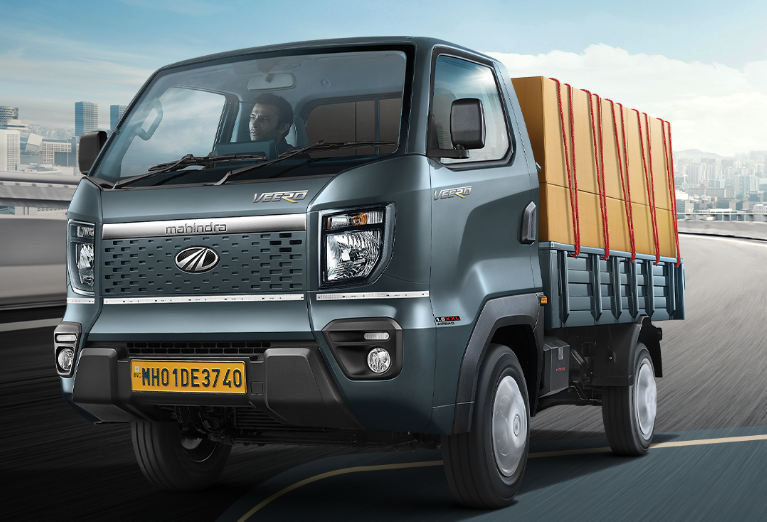
Mumbai: Mahindra & Mahindra has finally begun to see a rebound in the growth of its light commercial vehicles from October this year, its top management told analysts after the second quarter results. The transcript of this Q&A session has been uploaded on the company’s website.
“On the LCV side, we have been talking about a difficult industry growth scenario over the last few quarters. We are, finally in October, seeing a positive turnaround,” said Rajesh Jejurikar, ED and CEO (Auto and Farm Sectors).
One of the parameters that is constantly watched closely for pickups is the mandi (wholesale market) arrivals given that it is linked to demand this was up by 20% in October and M&M was seeing, for the first time, a change in momentum.
This is expected to get a further fillip with the Veero that was launched in September. “We believe we have a very good product. Not only is it very capable from a commercial vehicle segment point of view, but it is the first real car-like product,” said Jejurikar.
Good growth expected
The company believes that LCVs are now well poised for good growth that is largely driven by “what happens” to fruits and vegetables. “So, we had two or three crops of fruits and vegetables being destroyed which was affecting mandi arrivals and had an immediate impact on LCV demand. That has changed from October onwards. So, that is a big change event, and that is possibly why we have seen a better LCV momentum than many quarters,” he explained.
M&M’s core business of SUVs has been firing on all cylinders and the recently launched Thar Roxx has literally set the customer order books afire. This will necessitate an increase in capacity which could be a 10% jump to around 55,000 units in the coming months.
“At this point in time, we do not have an additional capacity increase plan for ICE (internal combustion engine) vehicles. We do feel a need to go back to the drawing board on that, given that some of the products have done better than what we thought, 3XO being one,” elaborated Jejuirkar. Facilities like Nashik, home home to models such as 3XO, Thar, Thar Roxx etc, are packed to the gills.
“So, we are capacity constrained right now on some of the ICE models. We are not sure exactly what we are going to do, but we will be working on what we need to do by way of strengthening the ICE manufacturing footprint as well,” he continued. The electric vehicle capacities will start kicking in once production begins and Phase I will see 10,000 units being added.
Cannibalisation from electric
Jejurikar admitted that there could be some cannibalisation when this would happen and it, therefore, made sense to go in for a wait-and-watch approach. He was, however, categorical that this would not extend to all products in the M&M stable.
“For example 3XO is not going to have any cannibalisation with the electric origins…I don’t think Thar will either. We are in that stage of calibrating that we do need to do something on ICE capacity. How much of it can be tweaked within the existing infrastructure and plants that we have, is what is really the exercise on hand at the moment,” he said.
As for the decision to slash prices of the XUV 700 in July and August this year, the idea prior to this was to first make the brand more accessible. This involved launching an AX5 select in May which “kind of got” into the INR 17 lakh price point.
However, this was not going to be enough which meant “actually making the attractive part of our portfolio” very accessible. This comprised the two top-end versions — AX7 and AX7L — that took up 75% of the mix earlier and were now down to about 50%.
“We expect that if you make the top two versions very accessible on price, the mix will go up and the total volumes will also increase. Numbers went up from an average of about 6,000 to 8,500 units and boomed way beyond that in the festival season,” said Jejurikar. Today, the mix has gone up along with total volumes with the top two versions back on the waiting list.
Taking the right call
“We believe that we had to take a call to get the price right so that we kept growth going,” he added. Had this not happened, growth could have been hit as also the margins.
“If growth slows, margin is definitely going to go down with time. So, on a medium-term basis, we must keep the growth momentum going. We have to take decisions which allow us to protect our volumes when they need to be protected,” said Jejurikar.
By the end of the day, he added, these calls are taken in the best interest of protecting long-term growth. “And we are sure that as long as long-term growth is coming, margins will come…they will not if we make the wrong choices or wrong calls,” he signed off.
To learn more about the electric vehicle ecosystem and meet the key industry leaders, click here.

















